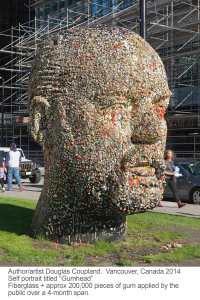Constantine Stamocostas
A crisp sunny autumn day welcomed Douglas Coupland apostles to the Rosyln Packer Theatre to hear ‘The Supreme Definer’, as described by Michael Williams, host of Blueprint for Living on ABC-Radio, talk about his books and to hear some new Couplandisms.
The crowd were not to be disappointed. Before the most famous definer of Generations walked on stage, a mixture of young and old, some looking at their phones, others at their books and a few at the Festival Programs all joining in a chorus of anticipatory mumble for one the heavy weights of the Sydney Writers Festival.
Douglas Coupland, 53, the most famous definer of generations, has an impressive body of work including 13 novels, seven works of non-fiction, short stories and works of visual art. He is also famous as the man who defined those born in the 1990s as Generation X. He says the term was “helpful personally and career wise, opened a lot of doors and will follow me to the grave”.
When Douglas Coupland was introduced to the audience, people were advised not to turn off their mobile phones. “Because frankly, at any point in proceedings, something might come up that might need to demonstrate that you are smart and I think that we can all agree that we can’t demonstrate that without your phone.”
The question was put to Mr Coupland: “You used to think that the internet was a metaphor for life but then you came to understand that life is a metaphor for the internet.”
He answered: “Birds make nests, for example, and human beings make stuff and there is nothing we make that is not an expression of our humanity. I mention this because people say, ohh, this new technology is so alienating, but no, aliens are not coming from outer space and handing it to us, we made it ourselves, and as such it can only be an expression of our humanity.
“Radio gave us the Beach Boys but it also gave us Hitler; what did TV give us? TV gave us cartoons, TV gave us American politics, and now we have the Internet, and the Internet gives us kitten videos and all sorts of ways of what human beings actually want to do.
“It doesn’t matter what we do, every trace we leave is pure humanity, there is no alienation anywhere.”
He says he likes being described as an experimental novelist.
“If you look at my 13 books, each one is unique. I think it would please my publishers if I did the same thing over and over and over, which would make it easier to peg me down, but it’s not going to happen.”
An example of Douglas Coupland experimental work has been the time he spent recently working as an artist-in-residence at the Google cultural institute in Paris were he turned search engine data into a book.
“I was very curious about what a raw search engine looks like. I had to go through four levels of clearance, it was pretty hard to do this. In one minute, you get three minutes of searches globally, which is 50,000 a second.
“I came up with a book of 1000 words that might be interesting if you typed them into a Google search box. There is an auto suggest algorithm that shows you the first two things that come up, but what would the next 98 things be that come up?”
One of the things that Douglas Coupland included in the book was the word ‘why’. He says millions of people are typing the same questions into the Google search engine such as “Why I am not married? Why is my life shit? Why do I hate my boss?
And Douglas Copeland says,” You just want to hug humanity.”
